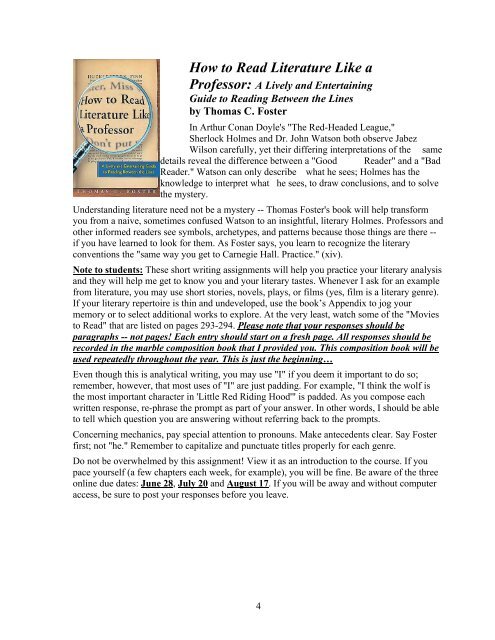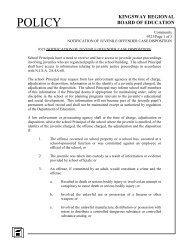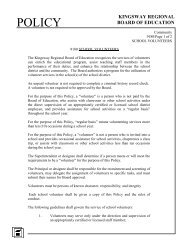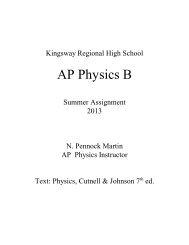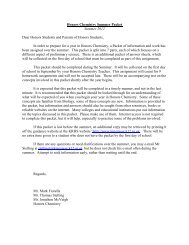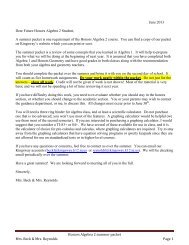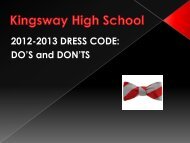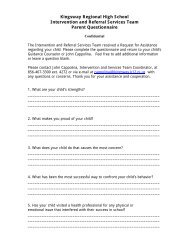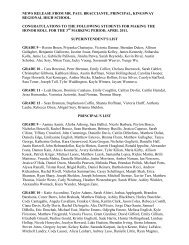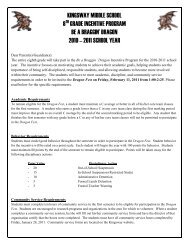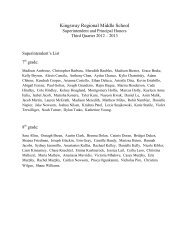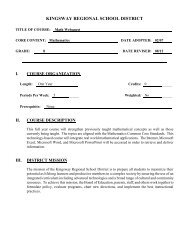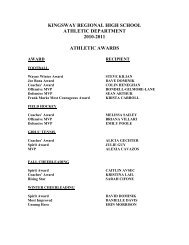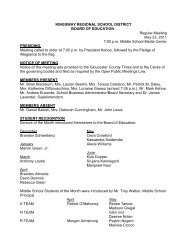Advanced Placement English IV- Literature and Composition
Advanced Placement English IV- Literature and Composition
Advanced Placement English IV- Literature and Composition
Create successful ePaper yourself
Turn your PDF publications into a flip-book with our unique Google optimized e-Paper software.
How to Read <strong>Literature</strong> Like a<br />
Professor: A Lively <strong>and</strong> Entertaining<br />
Guide to Reading Between the Lines<br />
by Thomas C. Foster<br />
In Arthur Conan Doyle's "The Red-Headed League,"<br />
Sherlock Holmes <strong>and</strong> Dr. John Watson both observe Jabez<br />
Wilson carefully, yet their differing interpretations of the same<br />
details reveal the difference between a "Good Reader" <strong>and</strong> a "Bad<br />
Reader." Watson can only describe what he sees; Holmes has the<br />
knowledge to interpret what he sees, to draw conclusions, <strong>and</strong> to solve<br />
the mystery.<br />
Underst<strong>and</strong>ing literature need not be a mystery -- Thomas Foster's book will help transform<br />
you from a naive, sometimes confused Watson to an insightful, literary Holmes. Professors <strong>and</strong><br />
other informed readers see symbols, archetypes, <strong>and</strong> patterns because those things are there --<br />
if you have learned to look for them. As Foster says, you learn to recognize the literary<br />
conventions the "same way you get to Carnegie Hall. Practice." (xiv).<br />
Note to students: These short writing assignments will help you practice your literary analysis<br />
<strong>and</strong> they will help me get to know you <strong>and</strong> your literary tastes. Whenever I ask for an example<br />
from literature, you may use short stories, novels, plays, or films (yes, film is a literary genre).<br />
If your literary repertoire is thin <strong>and</strong> undeveloped, use the book’s Appendix to jog your<br />
memory or to select additional works to explore. At the very least, watch some of the "Movies<br />
to Read" that are listed on pages 293-294. Please note that your responses should be<br />
paragraphs -- not pages! Each entry should start on a fresh page. All responses should be<br />
recorded in the marble composition book that I provided you. This composition book will be<br />
used repeatedly throughout the year. This is just the beginning…<br />
Even though this is analytical writing, you may use "I" if you deem it important to do so;<br />
remember, however, that most uses of "I" are just padding. For example, "I think the wolf is<br />
the most important character in 'Little Red Riding Hood'" is padded. As you compose each<br />
written response, re-phrase the prompt as part of your answer. In other words, I should be able<br />
to tell which question you are answering without referring back to the prompts.<br />
Concerning mechanics, pay special attention to pronouns. Make antecedents clear. Say Foster<br />
first; not "he." Remember to capitalize <strong>and</strong> punctuate titles properly for each genre.<br />
Do not be overwhelmed by this assignment! View it as an introduction to the course. If you<br />
pace yourself (a few chapters each week, for example), you will be fine. Be aware of the three<br />
online due dates: June 28, July 20 <strong>and</strong> August 17. If you will be away <strong>and</strong> without computer<br />
access, be sure to post your responses before you leave.<br />
4


